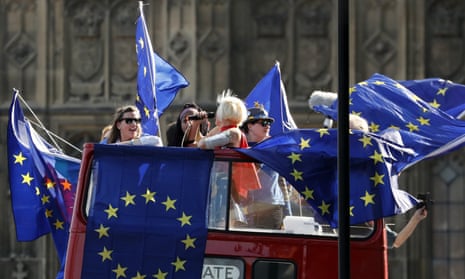The petition asking the British government to revoke article 50 and reconsider its plan to exit the European Union passed 6m signatures a day and a half after Britain was meant to have left the European Union.
The number of signatories passed the 5m mark the previous Sunday, making it the most popular petition to have been submitted to the parliament website. The previous highest total of 4,150,260 was for a 2016 petition calling for a second referendum should the initial poll not provide a definitive enough result.
The woman behind the petition, Margaret Georgiadou, said she had received death threats. She also said she had deleted her Facebook account after receiving a “torrent of abuse”.
Parliament will debate the petition on Monday. The government responded on 26 March that it would not revoke article 50, saying: “We will honour the result of the 2016 referendum and work with parliament to deliver a deal that ensures we leave the European Union.”
Since then, Theresa May’s Brexit deal has been rejected by MPs for the third time, this time by 58 votes; the DUP’s deputy leader, Nigel Dodds, said he would rather the UK stayed in the EU than back her withdrawal agreement.
May is set to return to Brussels for an emergency European council summit on 10 April. The EU27 expect her to ask for a longer delay or accept a no-deal Brexit two days later, on 12 April.
There have been conspiracy theories about the petition on both sides of the debate. Some said crashes on the site since the petition launched were a plot to prevent further signatures.
Others claimed that a small proportion of signatures from overseas IP addresses – including one from North Korea – meant the petition had been hijacked by bots. In fact, 96% of the signatures were from the UK.
